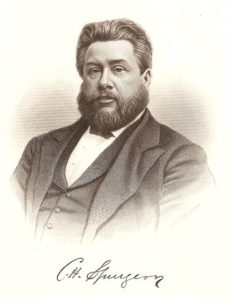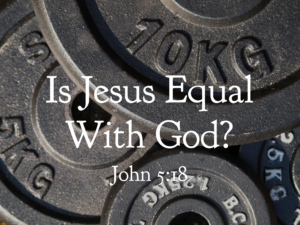One of the passages cited as proof that Jesus pre-existed in heaven before being incarnated into the world comes from what is referred to as Jesus’ high priestly prayer:
John 17:4-5 (NASB) “I glorified You on the earth, having accomplished the work which You have given Me to do. 5 “Now, Father, glorify Me together with Yourself, with the glory which I had with You before the world was. (emphasis added)
The Definition of Glory
The word “glorify” in the Greek is doxazô, and it means to render or esteem glorious. It comes from the root word “glory” or doxa which means: opinion, hence praise, honor, glory.[1] Often when we hear the word “glory” in the Bible we assume that it’s something reserved for deity. After all, God said:
Isaiah 42:8 (NASB) “I am the LORD, that is My name; I will not give My glory to another, nor My praise to graven images.[2] (emphasis added)
Moreover, Scripture frequently speaks of rendering glory to God. For example:
Psalm 29:2 (NASB) Ascribe to the LORD the glory due to His name; Worship the LORD in holy array. (emphasis added)
Matthew 6:13 (NASB) ‘And do not lead us into temptation, but deliver us from evil. For Yours is the kingdom and the power and the glory forever. Amen.’ (emphasis added)
Luke 2:14 (NASB) “Glory to God in the highest, and on earth peace among men with whom He is pleased.” (emphasis added)
Thus, when Jesus asks God to give him the glory that he had with Him before the world was some conclude that this “glory” is proof he is deity. However, Scripture teaches us that glory is not reserved for God alone. Indeed, there are various kinds of glory.
There are Different Kinds of Glory
 When Paul wrote to the church in Corinth about the resurrection of the saints, he taught them that there are different kinds of glory:
When Paul wrote to the church in Corinth about the resurrection of the saints, he taught them that there are different kinds of glory:
1 Corinthians 15:39-41 (NASB) All flesh is not the same flesh, but there is one flesh of men, and another flesh of beasts, and another flesh of birds, and another of fish. 40 There are also heavenly bodies and earthly bodies, but the glory of the heavenly is one, and the glory of the earthly is another. 41 There is one glory of the sun, and another glory of the moon, and another glory of the stars; for star differs from star in glory. (emphasis added)
There are many other passages that speak of glory being associated with people and things. For instance:
- “Solomon in all his glory” was not clothed like the lilies of the field[3]
- The Old Covenant “came with glory”[4]
- The kingdoms of this world are said to have glory[5]
- God’s people, Israel, have glory[6]
- Moses had glory,[7] and both he and Elijah “appeared in glory”[8]
Indeed, God Himself is said to dispense glory:
Psalm 84:11 (NASB) For the LORD God is a sun and shield; The LORD gives grace and glory; No good thing does He withhold from those who walk uprightly. (emphasis added)
Thus, having glory is not an accurate indicator of deity.
Greek Pre-existence verses Hebraic Pre-existence
But what about the fact that Jesus said this glory was his before the world was? Doesn’t this prove Jesus pre-existed in heaven? It depends on whether you are referring to the Biblical view of pre-existence or that of the Greeks. The Greeks’ Platonic-inspired worldview included a belief that all souls pre-existed in heaven before coming to the earth. For example, the Church Fathers, trained in philosophy, interpreted Scripture through a Greek lens. Because of their Hellenized worldview, they surmised that Jesus literally pre-existed in heaven before he was born. On the other hand, the traditional Hebraic view of the Bible depicts things of worth as pre-existing in the foreknowledge of God. That is, they pre-existed, not in a literal sense, but in God’s mind, thoughts, plans, and purposes. For example, in Everyman’s Talmud: The Major Teachings of the Rabbinic Sages, Abraham Cohen explains that the Messiah existed in God’s mind before the world was created:
Seven things were created before the world was created: Torah, repentance, the Garden of Eden (i.e. Paradise), Gehinnom, the Throne of Glory, the Temple, and the name of the Messiah” (Pes. 54a). In a later work there is the observation: “From the beginning of the creation of the world king Messiah was born, for he entered the mind (of God) before even the world was created” (Pesikta Rab. 152b) [9] (emphasis added)
Was the Messiah literally born before Creation? No, but in the mind of God, the Messiah already existed. God said something similar about the prophet Jeremiah:
Jeremiah 1:5 (NASB) “Before I formed you in the womb I knew you, And before you were born I consecrated you; I have appointed you a prophet to the nations.” (emphasis added)
Jeremiah pre-existed, but only in the plan or mind of God. This traditional Hebraic perspective can also be applied to Creation. Case in point, John recorded the four living creatures and the twenty-four elders in heaven as saying:
Revelation 4:11 (NASB) 11 “Worthy are You, our Lord and our God, to receive glory and honor and power; for You created all things, and because of Your will they existed, and were created.” (emphasis added)
The NASB translators’ note says the text literally reads all things “were existed” and “were created.” In other words, they existed before they were created. How can that be? By first existing in the mind of God. King Solomon said something comparable when he wrote in Ecclesiastes, “Whatever exists has already been named.”[10]
This Hebraic concept of pre-existence is also seen in Paul’s letter to the church in Rome:
Romans 4:17 (NASB) (as it is written, “A FATHER OF MANY NATIONS HAVE I MADE YOU”) in the presence of Him whom he believed, even God, who gives life to the dead and calls into being that which does not exist. (emphasis added)

The NASB adds a translators’ note that says the text literally reads “calls the things which do not exist as existing.”[11] In other words, even though things don’t yet exist, God speaks of them as existing. The context here reveals as much. Even though as a couple Abraham and Sarah were “dead” reproductively, God called him the “father of many nations.” In God’s plan and foreknowledge, Abraham pre-existed as the father of many nations even though it was not yet a reality.
Peter also writes from the traditional Hebraic perspective on pre-existence when he says that Jesus was foreknown before the foundation of the world:
1 Peter 1:20-21 (NASB) For He [Jesus] was foreknown before the foundation of the world, but has appeared in these last times for the sake of you 21 who through Him are believers in God, who raised Him from the dead and gave Him glory, so that your faith and hope are in God. (emphasis added)
This would have been the ideal time for Peter to tell us that Jesus literally pre-existed. Instead, he wrote that Jesus existed in God’s plan or foreknowledge. In like manner, he also said that Jesus’ arrest and subsequent death was a part of God’s pre-determined plan and foreknowledge:
Acts 2:22-23 (NASB) 22 “Men of Israel, listen to these words: Jesus the Nazarene, a man attested to you by God with miracles and wonders and signs which God performed through Him in your midst, just as you yourselves know— 23 this Man, delivered over by the predetermined plan and foreknowledge of God, you nailed to a cross by the hands of godless men and put Him to death. 24 (emphasis added)
The crucifixion pre-existed in God’s mind before it ever occurred on earth. Naturally, John echoes Peter’s view of the “pre-existence” of Jesus’ death:
Revelation 13:8 (KJV) And all that dwell upon the earth shall worship him, whose names are not written in the book of life of the Lamb slain from the foundation of the world.[12] (emphasis added)
 Was Jesus literally slain from the foundation of the world? Of course not, but according to the Hebraic understanding of pre-existence, Jesus’ death was seen as accomplished before the world was created. So when Jesus asked God for the glory that was his before the world began, he wasn’t thinking or speaking like a Greek, but as a Jew. He understood that the glory that was due him was in prospect. That is, it existed in God’s plan and would be manifested at the proper time. This is underscored by the fact that Jesus said he had completed God’s work:
Was Jesus literally slain from the foundation of the world? Of course not, but according to the Hebraic understanding of pre-existence, Jesus’ death was seen as accomplished before the world was created. So when Jesus asked God for the glory that was his before the world began, he wasn’t thinking or speaking like a Greek, but as a Jew. He understood that the glory that was due him was in prospect. That is, it existed in God’s plan and would be manifested at the proper time. This is underscored by the fact that Jesus said he had completed God’s work:
John 17:3-5 (NASB) “This is eternal life, that they may know You, the only true God, and Jesus Christ whom You have sent. 4 “I glorified You on the earth, having accomplished the work which You have given Me to do. 5 “Now, Father, glorify Me together with Yourself, with the glory which I had with You before the world was. (emphasis added)
Technically, Jesus had not yet fully accomplished the work God had sent him to do. That wouldn’t become a reality until he uttered, “It is finished” from the cross and breathed his last.[13] Nevertheless, his sacrifice was as good as done. Thus, he was asking God for the glory that was a part of God’s pre-existing plan. Peter later tells us that it was given at Jesus’ resurrection:
1 Peter 1:21 (NASB) who through Him are believers in God, who raised Him from the dead and gave Him glory, so that your faith and hope are in God. (emphasis added)
What kind of glory was Jesus speaking of?
As we’ve learned, there are different kinds of glory. So what kind of glory was Jesus asking God to give him? Those who believe in the incarnation theorize that it was a “God-glory” that he sat aside when he became a man. However, Scripture never teaches this. What’s more, the context of John 17 disproves this theory by revealing that Jesus is not God. In his prayer, Jesus identifies the Father as the only true God:
John 17:1-3 (NASB) Jesus spoke these things; and lifting up His eyes to heaven, He said, “Father, the hour has come… 3 “This is eternal life, that they may know You, the only true God, and Jesus Christ whom You have sent. (emphasis added)
For Jesus, the Father alone is God, while he is the Christ (Messiah) whom the one true God sent. In addition, the context reveals that the glory Jesus is asking for cannot be a glory reserved for deity because he has in turn given it to his disciples:
John 17:20 and 22 (NASB) “I do not ask on behalf of these alone, but for those also who believe in Me through their word…22“The glory which You have given Me I have given to them, that they may be one, just as We are one; (emphasis added)
 If Jesus’ is speaking here of a God-glory, then we too are God because he has given it to us. However, Jesus isn’t God and neither are we. What then does this glory represent? Some scholars suggest a few possibilities, such as the glory associated with working miracles or preaching the gospel. However, this seems unlikely since not every disciple does these. What seems most probable, according to Scripture, is that Jesus is referring to the glory of sonship. To be sure, Jesus has glory as the only begotten son of God:
If Jesus’ is speaking here of a God-glory, then we too are God because he has given it to us. However, Jesus isn’t God and neither are we. What then does this glory represent? Some scholars suggest a few possibilities, such as the glory associated with working miracles or preaching the gospel. However, this seems unlikely since not every disciple does these. What seems most probable, according to Scripture, is that Jesus is referring to the glory of sonship. To be sure, Jesus has glory as the only begotten son of God:
John 1:14 (NASB) And the Word became flesh, and dwelt among us, and we saw His glory, glory as of the only begotten from the Father, full of grace and truth. (emphasis added)
This same glory of sonship is promised to the believer. For example, Paul writes that as children of God, we will be glorified with Christ:
Romans 8:16-17 (NASB) The Spirit Himself testifies with our spirit that we are children of God, 17 and if children, heirs also, heirs of God and fellow heirs with Christ, if indeed we suffer with Him so that we may also be glorified with Him. (emphasis added)
Elsewhere we read about God bringing many sons to glory and the glory of His children:
Hebrews 2:10 (NASB) For it was fitting for Him, for whom are all things, and through whom are all things, in bringing many sons to glory, to perfect the author of their salvation through sufferings. (emphasis added)
Romans 8:21 (NASB) that the creation itself also will be set free from its slavery to corruption into the freedom of the glory of the children of God. (emphasis added)
This glorification of the saints was a part of God’s foreknowledge:
Romans 8:29-30 (NASB) For those whom He foreknew, He also predestined to become conformed to the image of His Son, so that He [Jesus] would be the firstborn among many brethren; 30 and these whom He predestined, He also called; and these whom He called, He also justified; and these whom He justified, He also glorified. (emphasis added)
As children of God, we have yet to be glorified. Like Jesus, our glorification, which pre-exists in God’s foreknowledge, is being held in prospect until the proper time.
The People’s New Testament Commentary agrees that the glory Jesus was referring to was one of sonship:
God gave Christ the glory of Sonship and this resulted in their unity. So Christ gives to his disciples the glory of becoming the sons of God (John 1:12; 1Jo 3:1). This glory, the adoption and gift of the Spirit, ought to effect that they may be one as we are one.[14] (emphasis added)
Wesley’s Notes on the Bible echo this position, “The glory of the only begotten shines in all the sons of God. How great is the majesty of Christians.”[15] (emphasis added)
 Perhaps Charles Spurgeon, commenting on John 17:22, said it best when he eloquently described the wonders of the “glory that is to be revealed”[16] in the sons of God:
Perhaps Charles Spurgeon, commenting on John 17:22, said it best when he eloquently described the wonders of the “glory that is to be revealed”[16] in the sons of God:
Behold the superlative liberality of the Lord Jesus, for he hath given us his all… Had he given us some small pension from his royal coffers, we should have had cause to love him eternally; but no, he will have his bride as rich as himself, and he will not have a glory or a grace in which she shall not share. He has not been content with less than making us joint-heirs with himself, so that we might have equal possessions. He has emptied all his estate into the coffers of the Church, and hath all things common with his redeemed. There is not one room in his house the key of which he will withhold from his people…Christ hath put the flagon of his love and grace to the believer’s lip, and bidden him drink on for ever; for could he drain it, he is welcome to do so, and as he cannot exhaust it, he is bidden to drink abundantly, for it is all his own. What truer proof of fellowship can heaven or earth afford?[17] (emphasis added)
The glory Jesus prayed about in John 17 is not proof that he is God or that he literally pre-existed in heaven. Truly, God does not give His unique God-glory to others. And Jesus’ glory as the exalted Messiah is for him alone. However, those who believe that Jesus is the Christ–the one whom the only true God sent–will have the glory of sonship awaiting them in the coming age.[18] [19]
[1] #1391, 1390 New American Standard Exhaustive Concordance of the Bible.
[2] Also Isaiah 48:11
[3] Luke 12:27
[4] 2 Corinthians 3:7-11
[5] Matthew 4:8
[6] Luke 2:32
[7] Hebrews 3:3
[8] Luke 9:30-31
[9] Abraham Cohen, Everyman’s Talmud: The Major Teachings of the Rabbinic Sages, (Schocken, 1995), p. 347.
[10] Ecclesiastes 6:10
[11] Also, The Kingdom Interlinear Translation of the Greek Scriptures: “calls the things that are not as though they were.”
[12] Also the Jewish New Testament: Revelation 13:8: Everyone living on earth will worship it except those whose names are written in the Book of Life belonging to the Lamb [the Messiah] SLAUGHTERED BEFORE THE WORLD WAS FOUNDED.
[13] John 19:30.
[14] John 17:22, The People’s New Testament Commentary, accessed 8-1-19, https://biblehub.com/commentaries/pnt/john/17.htm
[15] John 17:22, John Wesley’s Notes on the Bible, accessed 8-1-19, https://biblehub.com/commentaries/wes/john/17.htm
[16] 1 Peter 5:1 and Romans 8:18
[17] Charles Spurgeon, “Morning, June 30”, Morning and Evening: Daily Readings accessed 8-1-19, http://www.ntslibrary.com/PDF%20Books%20II/Spurgeon%20Morning%20and%20Evening%20Readings.pdf
[18] For more on glory, see Luke 24:26; John 7:39, 12:16, 23; Acts 3:13; 1 Peter 1:7 and 20-21
[19] Ellicott’s Commentary for English Readers: “Here, as all through this Intercessory Prayer, the future which immediately grows out of the present is regarded as present; the fulness [sic] of the glory which awaits Him at His Father’s right hand is thought of as already given to Him; and the believers who have become, and will become, one with Him, to whom He has given eternal life (John 17:2) are thought of as sharers in it. It is the thought which is expanded by St. Paul when he speaks of the children being “heirs; heirs of God, and joint-heirs with Christ; if we suffer with Him to the end that we may be also glorified with Him” (Romans 8:17); and by St. John when he speaks of “children of God being like Him because we shall see Him as He is” (1John 3:1-2). https://biblehub.com/commentaries/ellicott/john/17.htm




Thanks for the in depth study. I’m sure we all wondered about this. A good scholarly explanation!
Thanks for the in depth reply. I am sure we have all wondered about this verse. Very scholarly explanation.
Thank you for your kind comments! Glad you found this post helpful.
Blessings!
Hi Friend, I’ve recently been wrestling with this one in the Greek, and I came up with an honest translation that seems more related to the context. Basically take “para” to mean “beside,” and connect “einai” (“to be,” but typically “was” in this verse) to “beside you”, which is the nearest phrase in the original Greek. Here it is:
“And now, father, glorify me thou beside thyself, the glory which I had before the world, to be beside thee.”
Again, this is a very honest rendering of the Greek, and it matches with the theme of Jesus being exalted to God’s right hand (beside thee). “Before the world” can also mean “in front of the world,” as in “for all to see.”
As you say, this rendering would support what we know from other passages. Thanks for commenting.
“And now, father, glorify me thou beside thyself, the glory which I had before the world, to be beside thee.” Luke Jones.
“Carefully regard what Jesus is talking about in the preceding verses:
Father, the hour has come; glorify Your Son, that the Son may glorify You…. I glorified You on the earth, having accomplished the work which You have given me to do. Now, Father, glorify me together alongside Yourself,to that glory I had before the world.”
The glory which Jesus had alongside (para) the Father before the world isn’t referring to a glory which Jesus had before the creation of the heavens and the earth. He is referring to the glory he had alongside (para) the Father in terms of the works he was doing before the people of the world (17:4), those who hated Jesus and the disciples who are not of the world.
I speak the things which I have seen para my Father; therefore you also do the things which you heard para your father. 8:38
How can you believe, when you receive glory para one another and you do not seek the glory that is para the one and only God? 5:44
Now they have come to know that everything You have given me is para You. 17:7.”. Trinity Delusion.
Nevertheless, your article is well researched and very impressive.
This position would presuppose that Jesus literally preexisted para (with, alongside) God in heaven. The Jews of the first century certainly would not have held to a literal preexistence. As I state in the article, I believe Jesus is referring to a glory that he had in prospect. Jesus has been gloried and he is para (with, alongside) the Father in His glory.
Blessings,
OGW
In my studies, the best translation that I personally have been able to find for this one specific passage, and remains in harmony with the original scriptures, is taken from (The Book Of Yahweh, pg. 834) which reads as follows:
5. And now Father, glorify Me beside Your
Own Self, with the glory which I am to have with
You before the world to come.
https://www.theonenessofgod.org/hrf_faq/john-175-with-the-glory-which-i-had-with-thee-before-the-world-was/#
Thanks Caleb!
Hi,
Whilst having rejected any notion of Jesus’s literal preexistence a long time ago, and I concur with a lot of what you wrote, I׳m seriously wondering how this verse should fully be understood.
I’m not there yet but wrestling with the word ‘world’ which everywhere else in John, including in the verse following, refers not to the physical creation but the environment of people without the knowledge of God.
Jesus had already been glorifying God in his ministry as God had been glorified in and through him, before the ‘world’. His glory was not his own but the Father’s who was already glorifying him.
I’m leaning towards a post resurrection glory that would fulfil a process that had already started in some way.
Still a way to go before the full revelatory penny drops, as it has done with so many other passages and verses. Will keep pressing in, asking, seeking, knocking.
Your thoughts welcomed 🙂
Greetings Vic,
Thanks for reading and commenting.
I have not researched the meaning of the word “world” so can’t really comment at this point.
I agree that the glory Jesus is referring to is a post-resurrection/exaltation glory.
Yes, let us keep pressing in to know Him more!
God bless,
OGW